.jpg)
Key Takeaways:
- Dried mealworms can be safe and beneficial treats for dogs, providing high levels of protein and nutrients.
- However, it is important to consider potential allergies and adverse reactions, and consult with a veterinarian before incorporating dried mealworms into a dog’s diet.
- When feeding dried mealworms to dogs, it is recommended to follow safe consumption guidelines regarding quantity and frequency, and also explore other healthy treat options.
Introduction: Can Dogs Eat Dried Mealworms?

Photo Credits: Petbrilliant.Com by Samuel King
Dried mealworms have become a popular topic of discussion among dog owners. In this section, we delve into the fundamental question: Can dogs eat dried mealworms? We will explore the safety aspects and potential benefits of incorporating these crunchy treats into a canine’s diet. By shedding light on this subject, we aim to provide dog owners with the necessary information to make informed decisions about their furry friends’ nutrition.
Exploring the Safety and Benefits of Dried Mealworms for Dogs
Text:
Dried mealworms for dogs can provide safety and benefits. Packed with protein and nutrients, they can be a natural, healthy alternative to mass-produced food. But, watch for potential risks and allergies. Consult a vet first.
When considering dried mealworms’ safety, keep allergies and reactions in mind. A vet can help decide if they’re suitable for your pup. Feed them in moderation, as part of a balanced diet. Also, include other healthy treats.
Insect-based diets are growing in popularity, due to sustainability and environmental benefits. Differentiate between types of insects. Dogs can eat dried mealworms safely, but not others like earthworms or outdoor insects. Fresh mealworms may pose more risk.
Pro Tip: When introducing anything new, start small and monitor reactions. If adverse effects occur, discontinue use and consult a vet.
Discover the power of dried mealworms’ nutrition for your pup!
Understanding Dried Mealworms and Their Nutritional Value
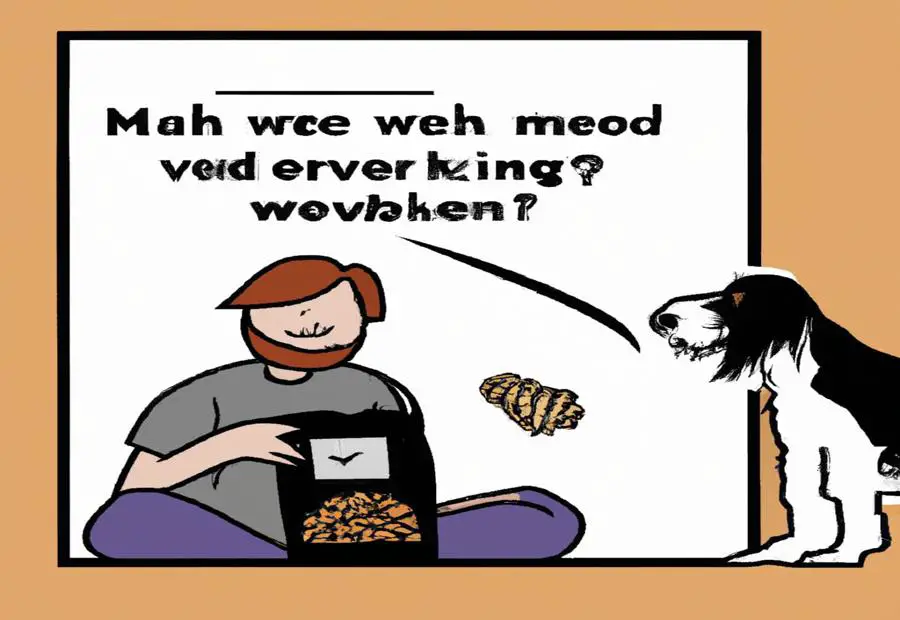
Photo Credits: Petbrilliant.Com by Bobby Harris
Dried mealworms have gained popularity as a potential food source for dogs, but what are their true nutritional benefits and possible risks? In this section, we will delve into the advantages of incorporating dried mealworms into a dog’s diet, along with important considerations to keep in mind. Stay tuned to discover how these tiny critters can contribute to your dog’s health and well-being.
The Benefits of Dried Mealworms for Dogs
Dried mealworms provide a plethora of advantages for pooches. Loaded with protein and essential nutrients, they are a super nutritious snack! They can even replace mass-produced dog food, allowing owners to give their pups natural and healthy diets. Insect-based diets are also beneficial for the environment.
However, before incorporating dried mealworms into a pup’s diet, consulting with a vet is wise. A vet can assess the individual needs and health conditions of the dog. Plus, dogs love their yummy mealworms! The advantages of dried mealworms for dogs are crystal clear.
High Levels of Protein and Nutrients
Dried mealworms boast high protein levels and nutrients that can improve your pup’s health! These tiny insects provide essential vitamins, minerals, and fats that support overall wellbeing. They are a great alternative protein source for dogs with allergies or sensitivities to common proteins like chicken or beef. Plus, their high nutrient density allows for smaller portion sizes.
It’s important to remember that your pooch may have allergies or adverse reactions to dried mealworms. It’s best to speak to your veterinarian before you add them to your pup’s diet.
Introduce dried mealworms to your pup—they could be the unconventional solution your furry friend needs for a change from kibble! Consult your vet to ensure they are suitable for your pup’s specific needs.
Potential Use as an Alternative to Mass-Produced Dog Food
Dried mealworms could be a great alternative to mass-produced dog food. They are full of protein and nutrients. Thus, they can help provide a great variety to a pup’s diet. Plus, they can be used as a healthier treat option!
The table below outlines the potential use of dried mealworms as an alternative to mass-produced dog food:
| Potential Use as an Alternative to Mass-Produced Dog Food |
|---|
| – High levels of protein and nutrients |
| – Sustainable and environmentally friendly option |
| – Provides variety in a dog’s diet |
| – Can serve as a healthier treat option |
It’s important to remember to talk to a vet before giving dried mealworms to a pup. They could have allergies or bad reactions to the insects. A vet’s guidance will ensure safe consumption and can maximize the benefits.
By thinking about dried mealworms as an alternative to mass-produced dog food, pet owners can explore sustainable and nutritious options for their furry friends.
The Potential Risks and Considerations
Dog owners should consult their vet before incorporating dried mealworms into their pup’s diet. Contamination risks, digestive issues and nutritional imbalances are all important considerations. Allergies and adverse reactions to mealworms can occur, ranging from mild digestive upset to severe allergic responses. Also, each dog has unique dietary needs, so owners should monitor their pup’s response and adjust accordingly. Knowing these risks and taking appropriate measures can help ensure dried mealworms are safely incorporated into a dog’s diet without causing harm.
Allergies and Adverse Reactions
Dogs can develop allergies and adverse reactions to dried mealworms, like itching, skin rashes, and digestive issues. Sometimes, vomiting or diarrhea can occur.
It is important for pet owners to watch for signs of allergies or adverse effects. If any are seen after consuming dried mealworms, discontinue use and consult a vet.
The vet can help decide the best course of action and propose alternative treats for dogs with allergies or sensitivities.
Consultation with a Veterinarian
It is important to consult with a vet before adding dried mealworms to a dog’s diet. The vet can give advice on whether it is suitable and if there are any risks. They can also tell you the correct amount and frequency for consumption.
Talking to a vet is beneficial to stay informed about insect-based dog food. They can share research findings, industry trends and any potential concerns.
Seeking veterinary consultation allows pet owners to make informed decisions. This way, benefits are maximized and risks minimized.
Safe Consumption Guidelines for Dogs
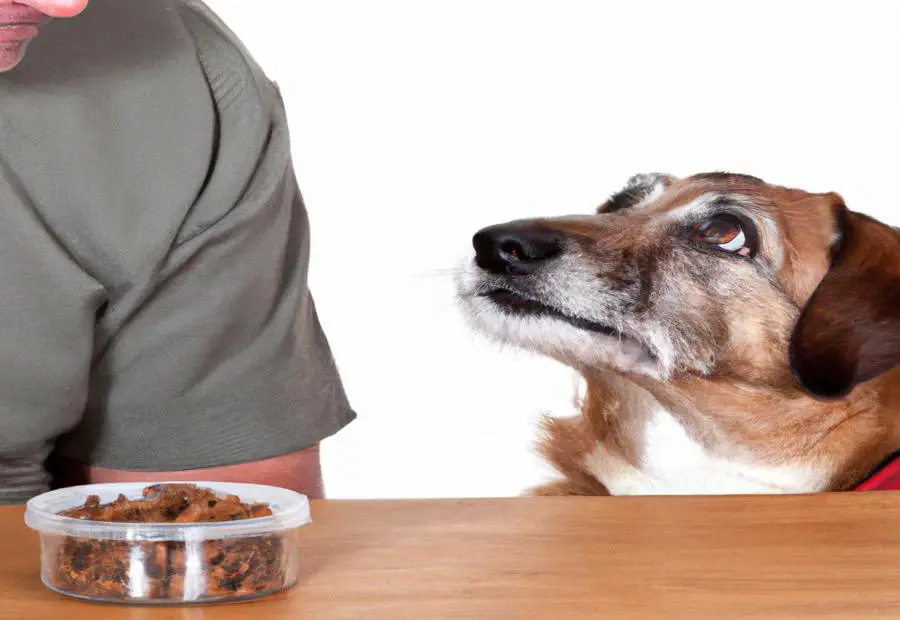
Photo Credits: Petbrilliant.Com by George Lewis
When it comes to feeding our furry friends, it’s crucial to know the safe consumption guidelines. In this section, we’ll explore the recommended quantity and frequency of dried mealworms for dogs, as well as alternative healthy treat options. By understanding the proper guidelines, we can ensure our pets’ well-being and provide them with nourishing snacks they’ll love. After all, our dogs deserve nothing but the best!
Recommended Quantity and Frequency of Dried Mealworms
Why not let your pup snack on some dried mealworms? It’s like a bug buffet for your furry friend! But, it’s important to consider the amount and regularity of feeding. To guide us, here’s a handy table outlining serving sizes and frequencies for different dog sizes:
| Dog Size | Serving Size | Frequency |
|---|---|---|
| Small (up to 20 lbs) | 2-3 dried mealworms | 3 times per week |
| Medium (20-50 lbs) | 4-6 dried mealworms | every other day |
| Large (50+ lbs) | 6-8 dried mealworms | daily |
Remember, individual dog needs vary. Consider age, activity level, and health when determining the quantity and frequency. Lastly, provide a balanced diet that meets all nutritional requirements. A vet can help make sure the treats match your pup’s dietary needs.
Other Healthy Treat Options for Dogs
Doggos can try lots of yummy healthy treats, not just dried mealworms. These snacks give them loads of nutrition and benefits. Examples include:
- Fruits and veg, like apples, bananas, blueberries, carrots, and sweet potatoes! Vitamins, minerals, and antioxidants, oh my!
- Lean meats like chicken or turkey, for protein to help build muscles.
- Yogurt or cheese, for important nutrients like calcium and probiotics.
- Goobers: Natural peanut butter is full of healthy fats, protein, and vitamin E. Just don’t give them the kind with xylitol!
- Oats or brown rice, for fiber and carbs without added sugars or preservatives.
Remember, while mealworms are great for doggies, it’s best to mix things up. Plus, there are some human foods that are bad for dogs, like chocolate, grapes, raisins, onions, garlic, and caffeine. So, always check with your vet before giving any new treats or food to Fido.
The BVA did a study that showed insect-based proteins in pet food can help the environment. This suggests insect-based dog food could be a sustainable, nutritious option for our beloved pooches in the future.
Exploring the Potential Future of Insect-Based Dog Food
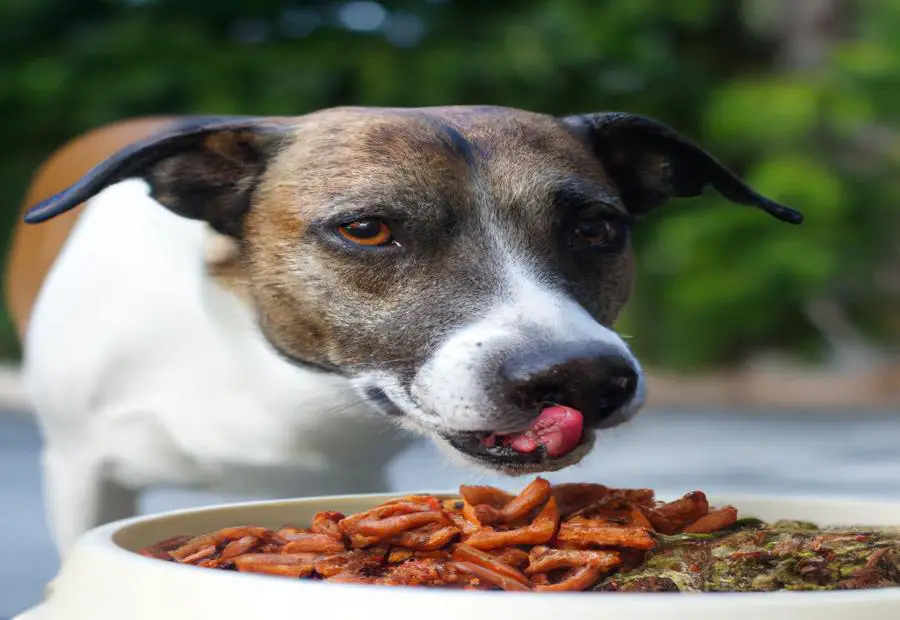
Photo Credits: Petbrilliant.Com by Jeffrey Allen
As we contemplate the potential future of insect-based dog food, we delve into the perspectives of the British Veterinary Association, the importance of sustainable food sources for pets, and the potential environmental benefits of insect-based diets for dogs. Join us as we explore the fascinating realm of alternative protein sources for our four-legged companions.
The Perspective of the British Veterinary Association
The British Veterinary Association (BVA) understand the need for sustainable and nutritious food sources for pets. They back the potential of insect-based dog food as an excellent option. They specifically point out that these diets can benefit the environment.
Dried mealworms are one insect the BVA recommends. They explain that these can provide dogs with a high level of protein and essential nutrients. To ensure proper nutrition, the BVA supports using dried mealworms as a treat. However, they encourage pet owners to consult with a vet for safe consumption guidelines.
The BVA addresses common worries and misconceptions about dried mealworms. They make it clear that unlike earthworms, these are safe for dogs. They also stress the importance of properly processed and contaminant-free mealworms.
To sum up, the BVA recognizes the importance of sustainable food sources for pets. They promote insect-based diets, particularly dried mealworms, as a nutritious option for dogs. They want to educate pet owners and urge consulting with a veterinarian. As finding sustainable food sources is key, this could prevent any potential dog riots over their mealworm fix.
The Importance of Sustainable Food Sources for Pets
Sustainable food sources for our four-legged friends are essential for their long-term well-being. As pet owners become more aware of the environment, there’s a higher demand for sustainable alternatives. Insect-based diets are a viable and nutritious option.
Dried mealworms are a sustainable protein source as they take fewer resources than traditional livestock farming. They need less water, land, and feed. This reduces the carbon footprint associated with pet nutrition and lessens the pressure on natural resources and greenhouse gas emissions.
Sustainable food sources also create biodiversity and ecological balance. Insects lessen the need to rely solely on beef or chicken. By diversifying pets’ diets, we can support healthier ecosystems.
Consult with vets for individual pet needs. They can recommend appropriate quantities of dried mealworms or other insect-based treats.
In conclusion, sustainable food sources for pets are essential for both animal health and the environment. Pet owners should make informed choices that benefit their furry friends and the planet.
Insect-based diets for dogs: Saving the planet, one mealworm at a time!
Potential Environmental Benefits of Insect-Based Diets for Dogs
Text: Insect-based diets for dogs have potential environmental perks that are worth considering! By including bugs in their eating plan, dogs can help create a more sustainable food system. Here are 5 key points about the possible environmental advantages of insect-based diets for dogs:
- Insects have a much smaller ecological footprint than traditional livestock used in dog food production. This means fewer resources like land, water, and feed are needed to grow them.
- Insect farming produces much lower greenhouse gas emissions than conventional livestock farming. This could help lessen the effects of climate change.
- Insects are very effective at converting feed into usable protein, needing less feed input than traditional livestock. This makes food production more resource-efficient and sustainable.
- Incorporating insect-based diets for dogs can aid biodiversity conservation by reducing the demand for animal proteins that normally require large-scale agricultural practices that can lead to habitat destruction.
- Pet owners can get involved in promoting sustainable and eco-friendly food choices by embracing insect-based diets for dogs.
Thinking about these environmental advantages, exploring insect-based diets for dogs is a promising way to a more sustainable future. Along with proper nutrition and consulting with veterinarians, including insect-based dog food can help keep our pets and planet healthy.
So, let’s squish those myths and discover the truth about mealworms and their compatibility with canines!
Addressing Common Concerns and Misconceptions
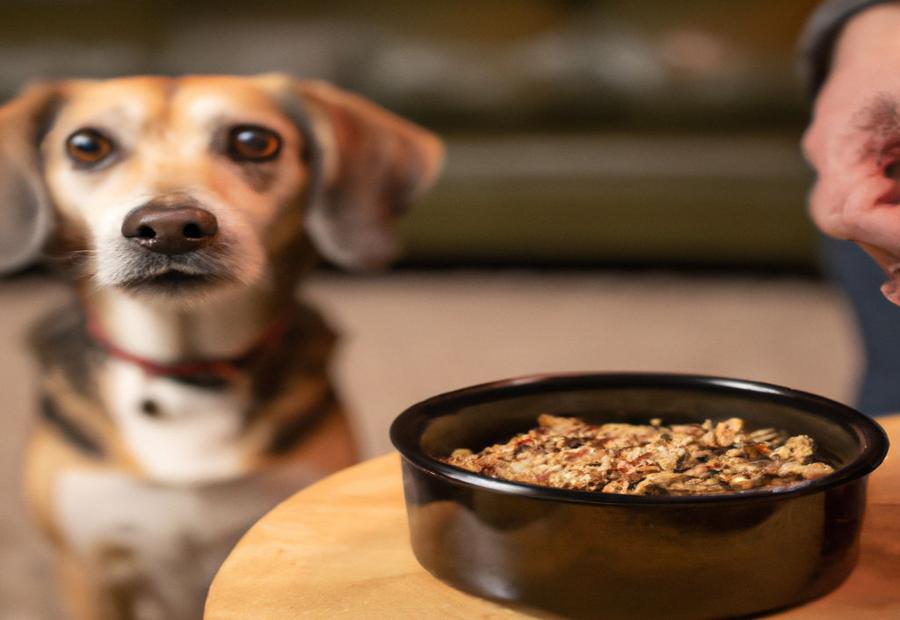
Photo Credits: Petbrilliant.Com by Thomas Hernandez
Addressing common concerns and misconceptions, this section will delve into differentiating between mealworms and earthworms, exploring whether dogs can consume other types of insects, and analyzing the safety of dried mealworms compared to fresh ones. With factual information and insights, we’ll debunk myths and provide clarity regarding the potential effects of dried mealworms on our canine companions.
Differentiating between Mealworms and Earthworms
Mealworms and earthworms differ in physical characteristics and nutritional value. Mealworms are small insects (1 inch in length) with a hard exoskeleton, cultivated specifically for food consumption. Earthworms, on the other hand, are segmented worms living in soil, providing vitamins and minerals.
It’s essential to understand the differences to make sure your pup gets the nutrition they need. Mealworms are a high-protein treat, while earthworms offer different nutritional benefits. However, it’s important to get earthworms from reputable sources free of any contaminants.
Insect-based treats are a great way to provide your pup with nutritious options. From mealworms to mosquitos, there’s a wide variety of insect-based snacks available. But remember, not all bugs are good for Fido’s dinner!
Can Dogs Eat Other Types of Insects?
Dogs can munch on bugs other than dried mealworms. Remember, not all insects are safe for dogs to consume. But certain bug species can be added to their meals and give them nutrition.
Crickets, grasshoppers, and silkworms can be served to dogs. These insects offer high levels of protein and essential nutrients. Dogs may also enjoy the taste and texture of other insects as a special snack.
It is significant to think about the safety and nourishment of the insects. Adding various insect species to a pup’s diet could provide them with diversity and potential health benefits.
Before giving any new type of insect to a dog, it is best to speak to a vet. The vet can help with suitable insect choices and any worries or potential risks associated with feeding dogs various insects.
The Safety of Dried Mealworms in Comparison to Fresh Mealworms
Dried mealworms are seen as safe for pups, just like fresh mealworms. Let’s explore safety further!
Comparing the two:
| Factor | Dried Mealworms | Fresh Mealworms |
|---|---|---|
| Allergies and Reactions | Could cause allergies or adverse reactions in sensitive dogs | Could cause allergies or adverse reactions in sensitive dogs |
| Nutritional Value | High in protein and nutrients, a great diet supplement | Protein and nutrients may vary due to moisture content |
| Shelf Life | Long shelf life, no need for refrigeration | Short shelf life, store in fridge |
| Texture and Palatability | Crunchy texture, but may depend on individual taste | Soft texture, but may depend on individual taste |
It’s important to keep in mind – dried mealworms are usually safe for dogs, but it’s best to check with a vet first. Also, consider any allergies or dietary needs your pup may have.
Who knew mealworms could be a dog’s delight – and a vet’s fright!
Conclusion: Mealworms – A Safe and Beneficial Treat for Dogs
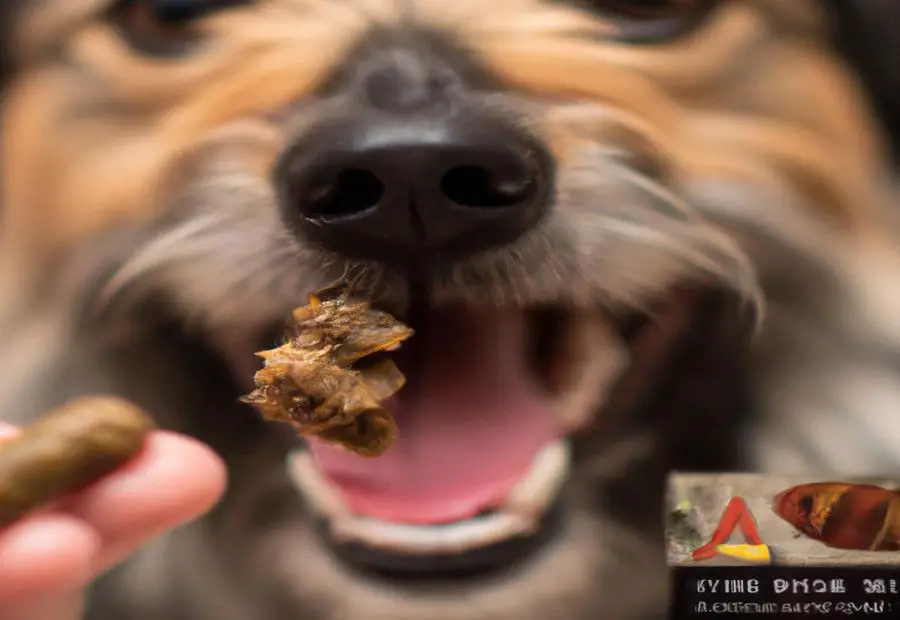
Photo Credits: Petbrilliant.Com by Vincent Martin
Mealworms – a nutritious and sustainable option for your furry friend? In our conclusion, we’ll summarize the benefits and risks of dried mealworms for dogs, highlight the importance of proper nutrition and consultation with a veterinarian, and explore the future potential of insect-based dog food. Stick around to discover if dried mealworms are truly a safe and beneficial treat for your canine companion.
Summary of Benefits and Risks of Dried Mealworms for Dogs
Dried mealworms offer several pros and cons for dogs. They are a great source of protein and nutrients, making them a great treat option. Also, they can be used as an alternative to mass-produced dog food. However, there are risks such as allergies and adverse reactions that need to be taken into account. Consult your vet to make sure it’s safe for your pup!
Note that dried mealworms can be beneficial, but should not be the main component of a dog’s diet. A balanced meal that includes other treats is always best. Organizations like the British Veterinary Association are exploring insect-based dog food due to its sustainability and nutritional value.
When considering different types of insects, this article specifically focuses on dried mealworms for dogs. The safety of fresh mealworms versus dried ones has not been discussed – so keep that in mind when feeding your pup!
Importance of Proper Nutrition and Consultation with a Veterinarian
Proper nutrition for dogs is a must for their health and wellbeing. A balanced diet with the right nutrients is key. Consultation with a vet can help figure out the best diet for each individual pup. Age, breed, size, and any health conditions must be taken into account. A vet can also provide tips on the types of foods and treats, like dry mealworms, that are suitable.
Protein and nutrients like vitamins and minerals are vital for muscle development and overall health. Before giving a dog new food, including dry mealworms, make sure to get a vet’s opinion. They can identify potential allergies or sensitivities and suggest alternatives if needed.
Nutrition isn’t just about picking the right food, portion control and frequency of feeding also matter. The vet can give advice on the amount and types of treats, based on the pup’s needs and calorie intake.
Vets are essential for providing our canine companions with the best care. By focusing on proper nutrition and seeking vet guidance, we can make sure our dogs stay happy and healthy.
Future Potential of Insect-Based Dog Food as a Sustainable and Nutritious Option.
Insect-based dog food may be a sustainable, nutritious option for the future. It offers unique benefits that make it an attractive alternative to mass-produced dog food. For example, mealworms are high in protein and nutrients, contributing to a balanced diet for dogs. Plus, insect-based dog food could help with sustainability in pet food production, as insects are a renewable source of nutrition. Organizations like the British Veterinary Association recognize the importance of sustainable pet food sources. Insect-based diets also have potential environmental benefits, as they require fewer resources and have a lower carbon footprint. We should consider the future potential of insect-based dog food as a sustainable, nutritious option for our canine companions.
Some Facts About “Are dried mealworms bad for Dogs”:
- ✅ Dogs can safely eat dried mealworms as they provide high levels of protein that can benefit them. (Source: Team Research)
- ✅ Certain breeds of dogs with weak immune systems should avoid eating dried mealworms, as it may lead to illnesses like worms or tapeworms. (Source: Team Research)
- ✅ Insects, including mealworms, can cause allergic reactions in some dogs, so it’s best to be cautious if unsure how a dog will react. (Source: Team Research)
- ✅ Dried mealworms are commonly used as fish bait or sold in pet stores due to their high protein and fat content. (Source: Team Research)
- ✅ Before adding dried mealworms to a dog’s diet, it’s important to consult with a veterinarian to ensure safety for the specific dog. (Source: Team Research)
FAQs about Are Dried Mealworms Bad For Dogs
Are dried mealworms bad for dogs?
Dried mealworms are not bad for dogs. They contain high levels of protein that can be beneficial for them. However, some breeds of dogs with weak immune systems should avoid eating dried mealworms, as it may lead to illnesses such as worms or tapeworms. It is best to consult with a veterinarian before adding dried mealworms to a dog’s diet.
Can dogs eat mealworms as a meal substitute?
Mealworms alone are not a sufficient substitute for a balanced dog diet. While mealworms are high in protein and fat, dogs also need carbohydrates, vitamins, and minerals. It is important to provide a variety of food sources to ensure a balanced canine diet.
Are mealworms safe for dogs to eat?
Yes, mealworms are safe for dogs to eat. They are a natural delicacy for dogs and do not contain any additives or preservatives that can harm their health. However, it is recommended to feed mealworms to dogs in limited quantities to avoid digestive upsets.
Can dogs eat mealworms from wild sources?
No, dogs should not eat mealworms from wild sources. Commercially available mealworms are safer as they are bred specifically for consumption. Wild mealworms may be contaminated and carry parasites or bacteria that can be harmful to dogs.
Can dogs on vegan diets eat dried mealworms?
Dogs on vegan diets should not consume dried mealworms. While mealworms are high in protein, they come from an animal source. Vegan diets for dogs can lead to protein deficiencies, imbalances in amino acids, and vitamin and mineral deficiencies. It is important to consider the health and well-being of dogs when making dietary choices for them.
Are mealworms a sustainable alternative to traditional dog food?
Mealworms are considered a potential alternative to traditional dog food as they are high in protein and can be sustainably produced. Insects, like mealworms, are more efficient at converting food into protein compared to traditional livestock. Insects also emit fewer greenhouse gases during production. However, mealworms alone are not a sufficient substitute for a balanced dog diet, and more research is needed on the long-term effects of insect-based diets for dogs.
